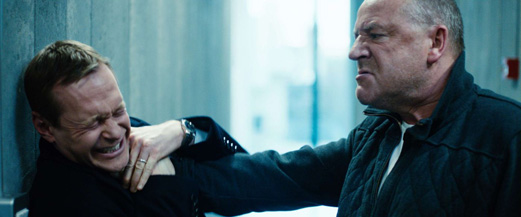Movie Review: The Sweeney
By Matthew Huntley
February 11, 2013
BoxOfficeProphets.com

This is a shame, too, because from its opening act to when the plot officially kicks in, The Sweeney has a decent hold on us. It’s around the halfway mark, when everything is in place, that the movie loses its grip and begins to run out of steam. It’s as if the filmmakers assumed it could simply cruise along on genre standards and no longer had to be original. By the end, I envisioned them holding a “crime drama” checklist and systematically going down it until they covered everything. Too bad they didn’t add their own checks, particularly new ones.
The film focuses on a specialized unit of the London Metropolitan Police Service called “the Flying Squad,” so named because it has the authority to operate anywhere within the city without having to observe usual district boundaries. The Sweeney, in turn, is slang for the Flying Squad (named after the character Sweeney Todd in the eponymous musical), and the department’s main area of expertise is high-profile robberies.
And indeed it opens with the Sweeney, led by the rough and tough Jack Regan (Ray Winstone), thwarting a half-million dollar gold bar heist in a downtown London warehouse. Jack leads the elite team that includes the young but forceful George Carter (Ben Drew), whose dedication and impeccable record have him on the cusp of a promotion, and Nancy (Hayley Atwell), Jack’s married lover who happens to be the wife of Ivan (Steven Mackintosh), an internal affairs officer who’s investigating the Sweeney’s questionable methods. The unit may take down dangerous bad guys and ultimately make London safer, but there have been civil complaints about how they go about their business, including the use of baseball bats against suspects.
Of course, Jack defends himself and his unit, and Ray Winstone being Ray Winstone, makes his character someone you don’t want to argue with, even if he does make crooked deals on the side with a personal informant (Alan Ford). He’s the kind of man who will end you with his bare hands and not give it a second thought.
What does give Jack a second thought is the latest case he and his team are called in to investigate. Shortly after he and George survey the safety of a private bank in Trafalgar Square, three armed men rob a comparatively low-end jewelry store nearby. Before they make off with the merchandise, however, they inexplicably kill one of the customers, a 20-something female. The pieces don’t add up since the woman was unarmed and the robbers had supposedly already got what they came for. Why off her, and for just a couple hundred thousand dollars’ worth of jewelry?
That’s the question, and eventually Jack connects the incident to a notorious criminal (Paul Anderson) but comes up short with evidence. His boss (Damian Lewis of TV’s “Homeland”) tells him he’s in a heap of trouble for causing such a ruckus and giving internal affairs another reason to shut the Sweeney down. All the while, Jack is trying to start something serious with Nancy beyond just hot trysts at the Holiday Inn. It’s only after the same robbers strike the private bank that the plot suddenly thickens (although not very interestingly) and the bullets start flying.
At this point, The Sweeney begins to lose its edge over its fellow crime story brethren. An elaborate shootout sequence takes place across Trafalgar Square, and even though it’s exciting to a degree, it’s an obvious ode to, or perhaps imitation of, the famous downtown L.A. shootout Michael Mann employed in Heat. It’s a good 15 minutes long, and while it’s well staged and crafted, we’ve seen others like it and therefore it doesn’t yield the same freshness and spontaneity. The ensuing plot is also lackluster and could have just as easily been an episode of “CSI,” right up to the auto-pilot ending, which makes it easy for anyone who’s ever seen a crime drama to call things out before they happen. We get the usual care chase and that classic contrived moment when a character comes to and fires off a crucial shot at just the right second.
Fans of the genre probably won’t have a problem with anything I’ve just described, and I don’t think there’s anything overtly bad about The Sweeney, but part of me feels cheated because I was hoping that because it revolves around a specialized police unit, the movie itself would be more special, perhaps show or tell me something unique about the world of commercial armed robberies and what goes into investigating them. Once I learned what the Sweeney was, I was anticipating the screenplay would reach beyond just a traditional good guys vs. bad guys showdown in which the hero is unfairly accused of wrongdoing then vindicated in the final act because it turns out he was right all along.
Director Nick Love sets the film up to be something different but then settles on a routine execution. Soon enough, the characters stop having distinct personalities and are simply molded into archetypes whilst taking part in traditional shoot-outs and chases, the likes of which have been done to death. Granted, they’re done well, but they’ve been done.
The Sweeney, ultimately, is safe entertainment. It’s never boring and even amusing at times, and Winstone has a commanding presence, but my lasting feeling is the filmmakers wasted their opportunity to take their subject matter, characters and high production values into uncharted territory. When the film started out, I was eager to see what it was going to tell me about the Sweeney and how this particular police unit is different from others depicted in the movies. By the time it ended, it had simply blended in.